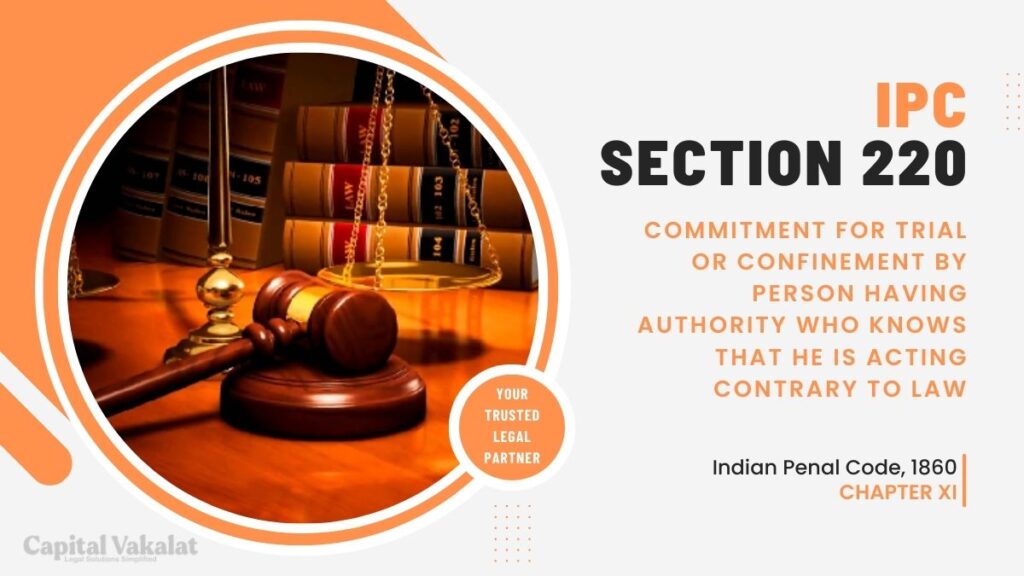In the realm of Indian Penal Code (IPC), Section 220 plays a crucial role in safeguarding the rights and liberties of individuals. This legal provision pertains to the “Commitment for trial or confinement by a person having authority who knows that he is acting contrary to the law.”

In this article, we will delve deep into Section 220 IPC, its significance, the responsibilities of those in authority, the concept of knowledge contrary to the law, its implications, historical perspective, case studies, challenges in its implementation, and the pressing need for reforms.
Introduction to Section 220 IPC
Section 220 of the Indian Penal Code is a legal provision that pertains to the commitment of individuals for trial or their confinement by a person in authority. It addresses situations where a person in a position of power knowingly acts contrary to the law while making such commitments or orders. This section is a crucial part of the Indian legal framework, designed to ensure that those with authority do not misuse their powers to infringe upon the rights and freedoms of individuals.
Understanding the Significance of Commitment for Trial or Confinement
The commitment for trial or confinement of individuals is a critical aspect of the justice system. It is a process that ensures that individuals are brought to trial and, if necessary, confined for alleged offenses. Section 220 IPC highlights the significance of this process, emphasizing that it must be carried out in accordance with the law and with due diligence.
Person Having Authority and Their Responsibilities
This section emphasizes the importance of individuals in positions of authority. Those who have the power to commit individuals for trial or order their confinement bear a great responsibility. They are expected to act in accordance with the law, ensuring that the rights of the accused are protected at all stages of the legal process.
Knowledge Contrary to the Law
One of the key elements of Section 220 IPC is the requirement that the person in authority must have knowledge that their actions are contrary to the law. This knowledge element is crucial because it distinguishes between unintentional errors and intentional misconduct. It places a significant burden on those in authority to act with due diligence and awareness of the legal provisions.
Implications and Consequences
When a person in authority knowingly acts contrary to the law in committing individuals for trial or ordering their confinement, there are severe implications and consequences. The accused individuals may suffer from wrongful imprisonment and a violation of their fundamental rights. Such actions can lead to legal repercussions for the person in authority.
Historical Perspective
To gain a deeper understanding of Section 220 IPC, it is essential to explore its historical perspective. This section will delve into the origins of this legal provision and the context in which it was introduced. Understanding the historical evolution of the law can shed light on its current significance.
Case Studies and Legal Precedents
Examining real-life case studies and legal precedents is crucial to comprehend how Section 220 IPC is applied in practice. By analyzing notable cases where individuals in authority were found guilty of acting contrary to the law, we can gain valuable insights into the workings of this legal provision.
Challenges in Implementing Section 220 IPC
The implementation of Section 220 IPC is not without its challenges. This section will explore some of the difficulties and obstacles faced in ensuring that those in authority adhere to the law when committing individuals for trial or ordering their confinement. These challenges range from the lack of awareness to issues of accountability.
The Need for Reforms
In recent times, there has been a growing awareness of the need for reforms in the legal system, including Section 220 IPC. This section will discuss the pressing need for reforms in this area, addressing issues such as strengthening accountability, improving legal education, and enhancing oversight mechanisms.
Conclusion
In conclusion, Section 220 of the Indian Penal Code plays a vital role in upholding the principles of justice and fairness in the legal system. It underscores the significance of those in authority acting in accordance with the law and the severe consequences of knowingly acting contrary to it. While challenges exist, there is a growing recognition of the need for reforms to ensure the proper implementation of this provision.
Frequently Asked Questions
What are the consequences of knowingly acting contrary to the law in this context?
Knowingly acting contrary to the law in committing individuals for trial or ordering confinement can lead to legal repercussions and a violation of the accused individuals’ rights.
Are there any recent legal reforms related to Section 220 IPC?
There is a growing awareness of the need for reforms in this area, focusing on improving accountability and oversight mechanisms.
How can individuals protect their rights when facing commitment for trial or confinement?
Individuals should be aware of their legal rights and seek legal counsel to ensure their rights are protected during the legal process.
What is the historical background of Section 220 IPC?
The historical perspective of Section 220 IPC provides insights into its origins and the context in which it was introduced in the legal framework.